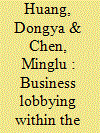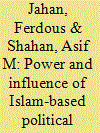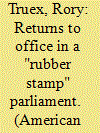| Srl | Item |
| 1 |
ID:
171086


|
|
|
|
|
| Summary/Abstract |
Most existing scholarship regards private businesspeople in China as allies of the party-state, without considering how the private sector’s policy influence is possible in an authoritarian state where the political elites dominate the policy-making process. Based on the large number of successful proposals that the All-China Federation of Industry and Commerce (ACFIC) has submitted to the Chinese People’s Political Consultative Conference, this study reveals the rising policy influence of private businesspeople in the past decade. It finds that their influence on government policy is not realized simply through collusion or informal ties with local governments at the stage of policy implementation. Instead, they now can voice their interests and exert influence as a group in national policy making at the central level through formal institutional channels. In recent years the influence of business associations affiliated with the ACFIC has been increasing, mainly due to institutional changes at the national level that encompass their input. This entails political co-optation that helps empower the private sector to exert influence on policy, rendering it unnecessary for the business community to challenge the political system from the bottom up.
|
|
|
|
|
|
|
|
|
|
|
|
|
|
|
|
| 2 |
ID:
191231


|
|
|
|
|
| Summary/Abstract |
Civil society plays an important role in European energy and climate policymaking. This paper poses the questions of how organized civil society handled the opportunities and challenges presented by the lockdown to its access to the climate and energy policymaking within the European Commission (EC)? How has the balance between organized civil society groups and businesses in Europe been affected by pandemic-related travel restrictions? Moreover, what role has the EC played in creating such opportunities and affecting the legitimacy of democratic policymaking? This research sheds light on the changing role of the EC in democratic governance and policy formation in the European Union (EU) by examining the relationship between funding received by CSOs active in the policy areas of environment and climate, the number of meetings attended, and the importance of coalitions and networks. This research revealed a possible relationship between level of participation in policymaking and the operational support received from the EC. Despite the resources invested, opportunities for interest representation in the energy and climate policy areas disproportionately favor businesses and organizations with long-term relationships with and proximity to Brussels. Increased number of virtual meetings only marginally increased share of participation of NGOs in these meetings. Thus, a physical presence in Brussels and resource investment remain important factors in access to the EU policymaking.
|
|
|
|
|
|
|
|
|
|
|
|
|
|
|
|
| 3 |
ID:
133722


|
|
|
|
|
| Publication |
2014.
|
| Summary/Abstract |
Bangladesh has received scholarly attention about the extent and nature of Islamism in the political domain. We argue that, to analyze the significance of religion in the political process, it is essential to consider the role of religion in both influencing the policy and electoral outcome. Based on an in-depth qualitative study during the most recent election of 2008, we review previous elections results and the policy influence of religion-based parties; we argue that, in Bangladesh, Islamic parties' policy influence is very high and electoral success is very low. A deeply entrenched civil religion in the form of nationalistic identity bars religion from playing a significant role in influencing the voting behavior of the citizens. The mainstream political parties have so far failed to recognize the significance of this civil religion.
|
|
|
|
|
|
|
|
|
|
|
|
|
|
|
|
| 4 |
ID:
133015


|
|
|
|
|
| Publication |
2014.
|
| Summary/Abstract |
Are there returns to office in an authoritarian parliament? A new dataset shows that over 500 deputies to China's National People's Congress are CEOs of various companies. Entropy balancing is used to construct a weighted portfolio of Chinese companies that matches companies with NPC representation on relevant financial characteristics prior to the 11th Congress (2008-2012). The weighted fixed effect analysis suggests that a seat in the NPC is worth an additional 1.5 percentage points in returns and a 3 to 4 percentage point boost in operating profit margin in a given year. Additional evidence reveals that these rents stem primarily from the "reputation boost" of the position, and not necessarily formal policy influence. These findings confirm the assumptions of several prominent theories of authoritarian politics but suggest the need to further probe the nature of these institutions.
|
|
|
|
|
|
|
|
|
|
|
|
|
|
|
|